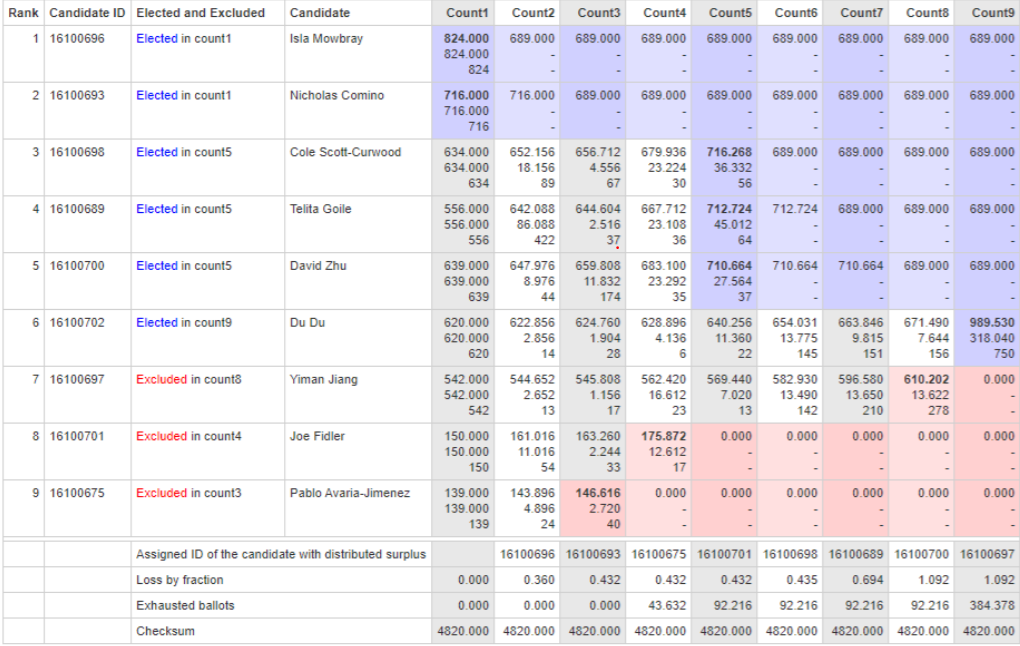A new board: election results explained
Emily Graetz reports on the 2021 USU elections.
Wait, I haven’t been paying attention. What’s been happening with the USU?
12 students have just spent two long weeks of hustling, bustling, pestering and promising as they vied for one of the 6 spots on the USU board. 2021 was a unique year with a hybrid election model seeing in person campaigning and online voting. On Friday night, the new board directors were announced at a very exciting, very cool election night party. These 6 will serve a two year term on the USU board and play an important role in representing student voices and providing vital services to the university - like clubs and societies and eateries.
So who are the new students elected to the board?
Isla Mowbray (Switch), Nicholas Comino (Moderate Liberal), Cole Scott-Curwood (Independent), Telita Goile (Switch), David Zhu (Libdependent) and Du Du (Independent) have all taken seats at the table. They’ll be joining the directors who’ve already served a year of their term, Prudence Wilkins-Wheat (Switch), Ruby Lotz (NLS), Ben Hines (Libdependent), Vikki Qin (Independent) and Belinda Thomas (Unity).
To be elected, candidates have to reach a quota of votes. This quota is calculated by the total number of votes divided by the number of available positions plus one. In this election, 4820 people voted - 4820 divided by 6 plus 1 equals 689. Votes are counted in rounds of preferences, starting with 1st preference.
Both Mowbray and Comino got onto board with quota in count 1. Scott-Curwood, Goile and Zhu made it through in count 5 whilst Du scraped through in count 9, narrowly beating Jiang. With 1,380 primary votes between them, it seems that Mowbray and Goile’s Switch partnership paid off, as did their three-way preference deal with Scott-Curwood which Goile and Scott-Curwood were beneficiaries of. Meanwhile, a mixture of preference dealings between Avaria-Jimanez,Jiang, Comino, Zhu and Du only proved fruitful for the latter two (Comino had already gotten through with quota). Last minute ‘how to vote’ advice shared on wechat by the International student group, Phoenix, listed Du first and Yiman second. Considering Phoenix is considerably influential, this was arguably the deciding factor for the final spot on board.
The election results in numbers! Lots of numbers! Source: https://usu.edu.au/Get-Involved/Student-Board-2021/Declaration-of-Final-Results-2021.aspx
What’s the deal with independent and factional candidates?
The SRC is the predominant political student body on campus, leaving many USU candidates to run on Independent tickets, proclaiming a “neutral stance”. Still, the board is always influenced by political dealings - evidenced in part by their preference deals. Both Mowbray and Goile expressed a strong desire to work with a left-wing majority board in their interviews with Pulp. While Zhu and Comino both stated a desire to work with candidates of all political factions they are both clearly aligned with the campus Liberals, making for a somewhat divided board. Nonetheless, board dealings are a generally unpredictable affair and once Independents and Senate appointed directors are thrown in the mix, anything can happen.
Where to from here?
Of the veteran directors, 4 will take up the executive positions of President, Vice President, Honorary Secretary and Honorary Treasurer. These positions, along with Director of Student Publications and other Committee leadership roles, are decided with an internal vote next Thursday.
The new board will see a slight left wing majority (Scott-Curwood is thought to side with the left) which may upset Ben Hines’ hopes for presidency and push an aspiring Wilkins-Wheat over the line. However, with events of last year’s presidency drama still looming and the increasing role of Senate Appointed Directors in board affairs, Pulp is hesitant to make any strong predictions.
In the meantime, you can stay up to date with the USU’s happenings by attending their monthly board meetings or following our ongoing coverage.
This article was amended to correct the statement that Nicholas Comino and Isla Mowbray had benefitted from preference deals. Both had been voted through with quota.

